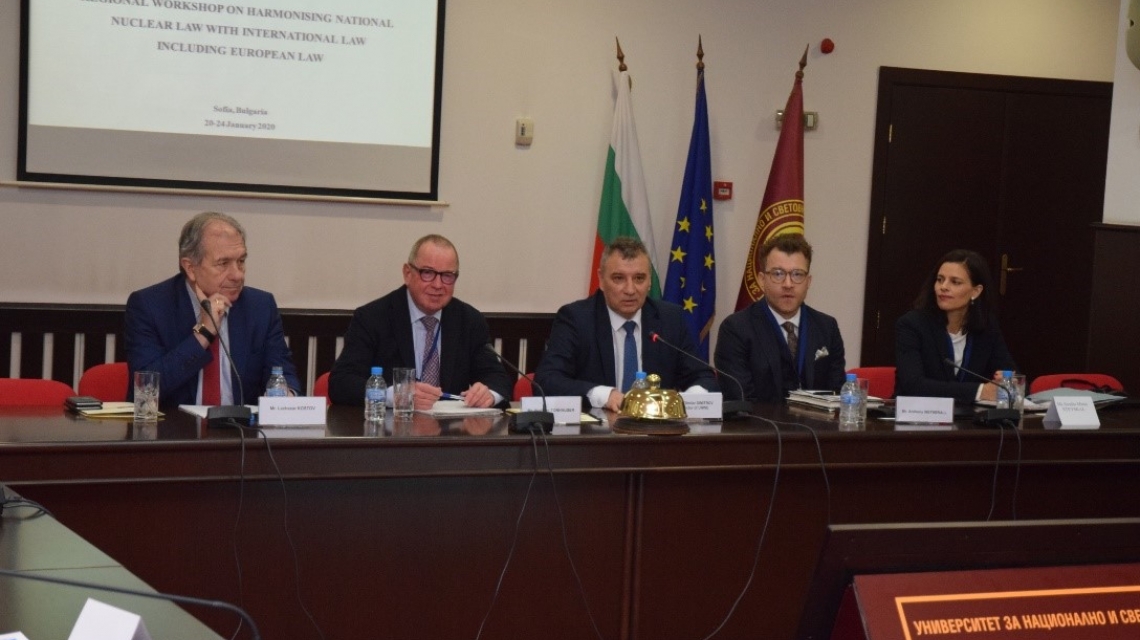Participants from 16 IAEA Member States in Europe and Central Asia recently took part in a regional workshop on nuclear law in Bulgaria to address their needs over the next two years for strengthening their legal frameworks regarding the safe, secure and peaceful uses of nuclear energy and ionising radiation.
The Regional Workshop on Harmonising National Nuclear Law with International and European Law, from 20 to 24 January 2020, was also an opportunity to discuss issues arising from the transposition of relevant EU Directives, specifically the basic safety standards Directive (Council Directive 2013/59/Euratom), the nuclear safety Directive (Council Directive 2014/87/Euratom) and the radioactive waste Directive (Council Directive 2011/70/Euratom). In this regard, the workshop benefitted from a representative of the European Commission, Ms Ruta Staneviciene, Legal Officer, Directorate ENER D.1, EURATOM Coordination Legal Matters and International Relations, Directorate-General for Energy, European Commission.
Prof. Dr. Dimitar Dimitrov, Rector of the University of National and World Economy (UNWE), said: “It was an honour for the university to host this important regional IAEA event. The workshop contributed to finding solutions for strengthening the national nuclear legislation of the represented states.” Prof. Dimitrov also presented a greeting letter on the occasion of the regional workshop by Mariana Nikolova, Vice Prime Minister for Economic and Demographic Policy of Bulgaria.
The regional workshop was just one in a series of events held in the context of the IAEA’s legislative assistance programme which includes the Technical Cooperation (TC) project entitled “Enhancing National legal Frameworks in European Member States”. The programme covers all areas of nuclear law and includes regional, sub-regional and national activities which help IAEA Member States to assess, review and develop nuclear legislation. It also includes activities focused on raising awareness among senior officials and decision-makers about the importance of the international legal instruments adopted under IAEA auspices and the importance of establishing and maintaining an adequate and comprehensive national nuclear legal framework.
Of some of the challenges discussed at the workshop, issues with complex and technical terminology and multiple pieces of legislation were highlighted as being of concern. Branko Brajic, Assistant Director at Serbian Radiation and Nuclear Safety and Security Directorate, and the lead coordinator for the new TC legislative assistance project said: “We benefited from the IAEA’s legislative assistance and adopted a new Law on Radiation and Nuclear Safety and Security in 2018. The new technical cooperation project provides the right vehicle from which other Member States can benefit from legislative assistance.”
In addition to the bilateral discussions held during the workshop to identify Member States’ legislative assistance needs over the next two years, many participants agreed that the continued training of lawyers at the annual IAEA Nuclear Law Institute (NLI) to support national capacity building in assessing, revising and maintaining an up-to-date national legal framework, is high on the agenda.
Zdravka Tecic, Head of the Sector for Radiological and Nuclear Safety in Civil Protection Department, Ministry of the Interior, Croatia said: “We plan to prepare a new draft law and need to benefit from assistance in ensuring that it will be aligned with the international instruments and standards. The timing of this workshop is good as it provided an opportunity to identify and map out our needs over the next two-years, including in the area of training.”
More than 50 participants took part in the workshop organised by the IAEA in cooperation with the UNWE and the Bulgarian Nuclear Regulatory Agency (BNRA).
Wolfram Tonhauser, Head, Nuclear Treaty Law Section, IAEA Office of Legal Affairs said: “We look forward to supporting Member States from Europe and Central Asia in strengthening their national nuclear legal frameworks and becoming parties to the relevant international legal instruments.”





